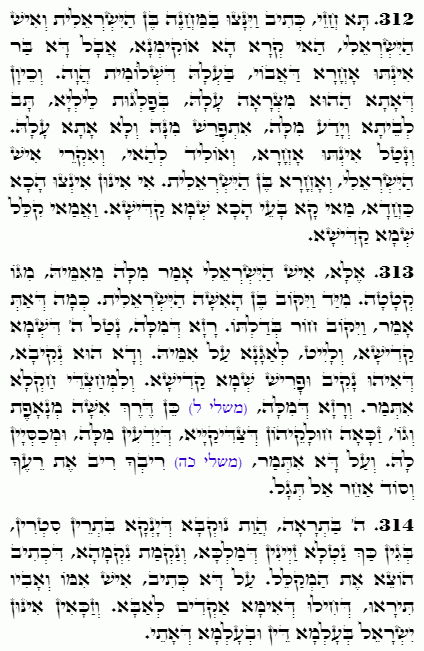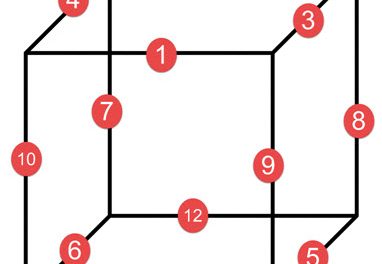Daily Zohar # 4591 – Emor – Bring forth the one who has cursed
Daily Zohar 4591

Hebrew translation:
313. אֶלָּא, אִישׁ הַיִּשְׂרְאֵלִי אָמַר הַדָּבָר מֵאִמּוֹ מִתּוֹךְ קְטָטָה. מִיָּד – וַיִּקֹּב בֶּן הָאִשָּׁה הַיִּשְׂרְאֵלִית, כְּמוֹ שֶׁנֶּאֱמַר וַיִּקֹּב חֹר בְּדַלְתּוֹ. סוֹד הַדָּבָר – נָטַל ה’ שֶׁל הַשֵּׁם הַקָּדוֹשׁ וְקִלֵּל, לְהָגֵן עַל אִמּוֹ. וְזוֹהִי נְקִיבָה, שֶׁהוּא נָקַב וּפֵרַשׁ אֶת הַשֵּׁם הַקָּדוֹשׁ, וְנֶאֱמַר לְקוֹצְרֵי הַשָּׂדֶה. וְסוֹד הַדָּבָר – (משלי ל) כֵּן דֶּרֶךְ אִשָּׁה מְנָאָפֶת וְגוֹ’. אַשְׁרֵי חֶלְקָם שֶׁל הַצַּדִּיקִים שֶׁיּוֹדְעִים דָּבָר וּמְכַסִּים אוֹתוֹ, וְעַל זֶה נֶאֱמַר (שם כה) רִיבְךָ רִיב אֶת רֵעֶךָ וְסוֹד אַחֵר אַל תְּגָל.
314. ה’ אַחֲרוֹנָה הָיְתָה נְקֵבָה שֶׁיּוֹנֶקֶת בִּשְׁנֵי צְדָדִים, מִשּׁוּם כָּךְ נָטְלָה אֶת כְּלֵי זֵינוֹ שֶׁל הַמֶּלֶךְ וְנוֹקֶמֶת נִקְמוֹתֶיהָ, שֶׁכָּתוּב הוֹצֵא אֶת הַמְקַלֵּל. עַל זֶה כָּתוּב, אִישׁ אִמּוֹ וְאָבִיו תִּירָאוּ, יִרְאַת הָאֵם הִקְדִּים לָאָב. אַשְׁרֵי יִשְׂרָאֵל בָּעוֹלָם הַזֶּה וּבָעוֹלָם הַבָּא.
.
Zohar Emor
Continued from previous DZ
#312
Leviticus 24:10,11
“וַיֵּצֵא בֶּן אִשָּׁה יִשְׂרְאֵלִית וְהוּא בֶּן אִישׁ מִצְרִי בְּתוֹךְ בְּנֵי יִשְׂרָאֵל וַיִּנָּצוּ בַּמַּחֲנֶה בֶּן הַיִּשְׂרְאֵלִית וְאִישׁ הַיִּשְׂרְאֵלִי.”
“וַיִּקֹּב בֶּן הָאִשָּׁה הַיִּשְׂרְאֵלִית אֶת הַשֵּׁם וַיְקַלֵּל וַיָּבִיאוּ אֹתוֹ אֶל מֹשֶׁה וְשֵׁם אִמּוֹ שְׁלֹמִית בַּת דִּבְרִי לְמַטֵּה דָן.”
“Now the son of an Israelite woman, whose father was an Egyptian, went out among the children of Israel, and this Israelite woman’s son and a man of Israel fought each other in the camp.”
“And the Israelite woman’s son blasphemed the Name of the LORD and cursed, and so they brought him to Moses. (His mother’s name was Shelomith, the daughter of Dibri, of the tribe of Dan.)”
Come and see, it is written, “And the son of the Israelite woman (בֶּן הַיִּשְׂרְאֵלִית) and a man of Israel (אִישׁ הַיִּשְׂרְאֵלִי) fought in the camp”. We have already discussed this verse, but this “man of Israel” is the son of another woman from his father, who was the husband of Shelomith. Since that Egyptian man came upon Shelomith at midnight, her husband returned home, knew what had happened, and separated from her, never coming to her again. He then took another wife and begot this son, who is called “אִישׁ הַיִּשְׂרְאֵלִי” “a man of Israel.” The other son, of the Egyptian, is called “בֶּן הַיִּשְׂרְאֵלִית” “the son of the Israelite woman.”
He asks, if they fought together here, what the holy Name was found here, and why did he curse the holy Name?
#313
He answers that the Israelite man said something during the quarrel about the mother of the son of the Israelite woman, implying that she was a prostitute. Immediately, “the son of the Israelite woman blasphemed.” As it says, “וַיִּקֹּב חֹר בְּדַלְתּוֹ” “and he made a hole in its door” (2 Kings 12:10). The secret of the matter is that he took the final ה He of the holy Name, which is Malchut, female aspect, and cursed to defend his mother. This is the breach that he made and the Name that he pronounced. This is told to the “reapers of the field” (the wise Torah scholars in Malchut).
The secret of the matter is,
Proverbs 30:20
“כֵּן דֶּרֶךְ אִשָּׁה מְנָאָפֶת אָכְלָה וּמָחֲתָה פִיהָ וְאָמְרָה לֹא פָעַלְתִּי אָוֶן.”
“This is the way of an adulterous woman: She eats and wipes her mouth And says, “I have done no wickedness.”
Blessed are the righteous who know this secret and conceal it. Therefore, it is said, Proverbs 25:9
“רִיבְךָ רִיב אֶת רֵעֶךָ וְסוֹד אַחֵר אַל תְּגָל.”
“Debate your case with your neighbor, and do not reveal another’s secret.” This secret is too deep to fully explain, and it is impossible to elaborate further.
#314
The final ה He of the Holy Name, representing the feminine aspect (Nukvah), draws from both sides—mercy and judgment. Therefore, she took the king’s weapon and avenged her vengeance, as it is written,” הוֹצֵא אֶת הַמְקַלֵּל” “Bring forth the one who has cursed” (Leviticus 24:14). Consequently, it is written, “אִישׁ אִמּוֹ וְאָבִיו תִּירָאוּ” “Each of you must respect his mother and father” (Leviticus 19:3), with the fear of the mother preceding that of the father. Blessed are Israel in this world and in the world to come.
Friday would be a good day to make a ** Donation, especially if you didn’t donate in the past week. Giving on Friday, which is an aspect of Yessod, expands the vessel for the Light and honor of Shabbat.
** Your donation doesn’t have to be given to the same place every week. You can alternate or split your donation among those who benefit you spiritually.

 Previous: Emor
Previous: Emor


